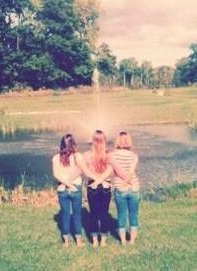 photo credit in link photo credit in link I write because I can't not write. Double negative be damned. Here's the thing about writing. It almost always starts out of necessity. I can't remember when I began writing, but I remember both times I've tried to quit. It doesn't work. It's not pretty. When I'm not writing, especially when I've decided that writing is too all consuming and I am officially in recovery, my mind does bad things. The irritability, the slide in confidence, the aimless melancholy leaks into my real life, my family life, in a very ugly-cry sort of way. And then the voices start. Okay, I'm not crazy. The voices belong to the characters who take up residence in my head between manuscripts. When I'm immersed in a manuscript, it's like being in love - the kind of infatuated, passionate, can't get enough of him feeling from our very first loves. Nothing and no one else exists, and that's okay. It keeps other characters at bay; other characters who belong in other works yet to come and are waiting patiently to tell their story. But they know when the manuscript is finished, and they make sure I know they are there. They start quiet. It's a whisper as I'm falling asleep. A glimpse of a new protagonist, her form nearly sparkling with intriguing possibility. The voice of an exciting new book boyfriend, deep and resonating, sight unseen. My mind begins to fill in the blanks without my permission, sometimes in dreams, sometimes in quiet moments when I'm not paying attention, sometimes when I'm knee deep in momhood and laundry and dishes. If I ignore these characters, their words and stories, they get loud. If I stubbornly refuse to acknowledge them, to enter into the agreement to tell their tale, this is when the ugliness starts. The only way back to normalcy, for me, is to begin. Stephen King says that "stories are found things, like fossils in the ground… The writer’s job is to use the tools in his or her toolbox to get as much of each one out of the ground as intact as possible.” I didn't understand this quote until a couple years ago. It's the idea that, as writers, we have only a certain amount of control over what and how and when we write. In the same way some words must be spoken, some songs must be sung, some stories just must be told, or they will wear a hole in us that can only be repaired by facing our fear and telling the truth. Because, as the man also says, "fiction is the truth inside the lie." So I'm a little in love with Stephen King. So what. He's a smart guy. This is what I know: I am a better person when I'm writing. I'm not talking about writing for pay. That's an entirely different topic, with a whole different set of struggles. I'm talking about writing with the door closed. Writing what I want to write. Letting the people in my head out, letting them speak and listening well. Staying true to my characters and their story. This is my therapy, my release, my fun, my tears, my heart. Writing is my bliss, even when it's not. This is why I write.
3 Comments
 My favorite part of the writing process is character development. My story ideas always originate with people. In The Fall of Our Secrets, there are two main characters: Laura and Nicole. They are different from each other in many ways, but have a common history and an unbreakable friendship. Before I ever had an inkling of what would happen in the book, I only had Laura and Nicole. As I got to know them in my mind, I began to see the details of their lives. This is how it is with each of my books. I am not a plotter, at least not at the beginning. Of course I know what the story will be about, occasionally I even have an overall theme. Somewhere around 10,000 words in, I do step back and spend quite a bit of time constructing the story beyond what is already in my head. Sometimes this entails reworking what I've already put down in print—which is okay. Even discarded words and sections are useful, because they've done their job at that point in helping bring the characters to life for me. Of course I know the direction of the story: I have a beginning and an end, and an idea of what possible routes will lead me there. The fun is in the journey. And in getting to know the people with whom I’m traveling. There’s a quote in On Writing by Stephen King. On Writing was a gift from my dad, who knew that I’d entertained the idea of writing for ages and just wanted me to start. I devoured that book years ago, before The Fall of Our Secrets was even an idea. At the time, I understood the concepts of good fiction, but more as a reader than a writer. We all know what works for us, what keeps us up late at night turning pages when we know the alarm clock will wake us far too early. It has taken finishing my own novel to really understand his words. King feels that “Stories are relics, part of an undiscovered world. The writer’s job is to use the tools in his or her toolbox to get as much of each one out of the ground intact as possible… Knowing the story wasn't necessary for me to begin work. I had located the fossil. The rest, I knew, would consist of careful excavation.” What an exhilarating feeling to know I get it. I actually get it. Exhilarating in part, I think, due to years of being trained to outline outline outline before ever daring to put pen to paper. As a liberated, tad-rebellious adult, I have learned that not everyone writes—creates—in the same way. As I said, I do use a loose outline. It gets tighter as the manuscript progresses. And it always revolves around the characters and what would be normal behavior for them, behavior that is already a vital piece of their established personalities. Nothing bugs me more than reading a book or watching a movie and the protagonist (or antagonist) suddenly takes a hard right and does something completely out of character. There goes my suspension of disbelief; the spell is broken, and from that point on I don’t believe in the story quite the way I did before. Because it’s so important to know my characters, to know their innermost thoughts and what drives them, I find it necessary to climb inside their world for a while as I’m writing. I need to see things through their colored glasses—we all wear them. Each and every one of us sees the world through variations of the same glass, all depending on our experiences, our journey so far. In creating the characters in my books, I’ve noticed that they are all a little bit me, until they aren’t anymore. Every one of them. Some have only a small element of me, some lose that element of me by the second chapter, and some retain an aspect or two of me through to the end. Many times my characters are composites of people I’ve known, but in some way or another, in order to write them, I have to identify with them. This is usually easy. It comes down to empathy. Even if I have never experienced something one of my characters is going through, you can bet I have a friend or family member who has, or who has known someone who has. Some of the situations my characters get into are ones I wouldn’t wish on my worst enemy. Some of the situations are wonderful, fantastic, and as I live vicariously through my characters I know this is one of the greatest perks of making up my own fictional worlds. Either way, I am always mindful of making sure that the people in my stories behave in accordance with the character I’ve developed them to be. Sometimes they surprise me—but then, sometimes in life people surprise us! Sometimes I find my characters taking my plot and running off in a different direction with it. I’ve found the best thing to do when this happens is to follow them and see where things go. Maybe we’ll backtrack and get on course again. But, if it serves the end result well, maybe we’ll just take that little detour. Physical appearance definitely comes secondary to the moment a character pops into my head. For instance, The Fall of Our Secrets began with Laura. She is the grounding force in this book, the everywoman, if you will. I knew her the moment I met her. It took sitting down and uncovering her backstory, fleshing out her life experiences and the little things—hopes, insecurities, strengths and weaknesses—that play into our choices and actions on a daily basis, for me to form a picture of her. Once I had an image in mind, I could write her. Having this image in mind makes it easier to communicate to the reader who Laura is, what she looks like, and why she behaves the way she does. I don’t think any of us enjoy reading an entire paragraph or more describing a character’s physical appearance. Even if it’s a really hot character. I always find it better to drop clues here and there, let the reader form their own image as they meet the character and get to know him or her. I’m sure Laura will look different in your mind than in mine, and that’s exactly the way it should be. I fall in love with my characters. I worry about them, dream about them, suffer their failures and celebrate their successes. I have no choice but to create worlds around them full of depth and emotion, because I must do right by them. Anything less would be lazy and pointless. When we’ve reached the end of our time together, I am left sated and fulfilled…and I miss them so much when they’re gone. I hope you feel the same. |
Categories
All
|
